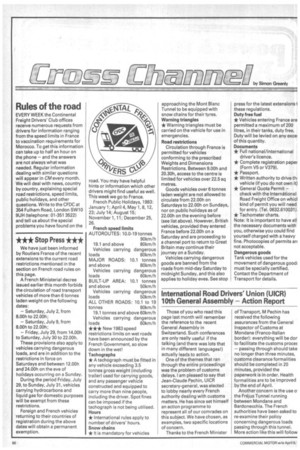*** Stop Press ***
Page 68

If you've noticed an error in this article please click here to report it so we can fix it.
We have just been informed by Routiers France of the recent extensions to the current road restrictions mentioned in the section on French road rules on this page.
A French Ministerial decree issued earlier this month forbids the circulation of road transport vehicles of more than 6 tonnes laden weight on the following dates: — Saturday, July 2, from 8.00h to 22.00h; — Saturday, July 9, from 8.00h to 22.00h; — Friday, July 29, from 14.00h to Saturday, July 30 to 22.00h.
These provisions also apply to vehicles carrying dangerous loads, and are in addition to the restrictions in force on Saturdays and between 12.00h and'24.00h on the eve of holidays occurring on a Sunday.
During the period Friday, July 29, to Sunday, July 31, vehicles carrying hydrocarbons and liquid gas for domestic purposes will be exempt from these restrictions.
Foreign and French vehicles returning to their countries of registration during the above dates will obtain a permanent exemption. road. You may have helpful hints or information which other drivers might find useful as well. This week we go to France.
French Public Holidays, 1983: January 1; April 4, May 1,8, 12, 23; July 14; August 15; November 1,11; December 25, 26.
French speed limits AUTOROUTES: 10.0-19 tonnes 90km/h 19.1 and above 80km/h Vehicles carrying dangerous loads 80km/h MAJOR ROADS: 10.1 tonnes and above 80km/h Vehicles carrying dangerous loads 60km/h BUILT-UP AREA: 10.1 tonnes and above 50km/h Vehicles carrying dangerous loads 50km/h ALL OTHER ROADS: 10.1 to 19 tonnes 80km/h 19.1 tonnes and above 60km/h Vehicles carrying dangerous loads 60km/h *** New 1983 speed restrictions limits on wet roads have been announced by the French Government, so slow down in the wet!
Tachographs *A tachograph must be fitted in any vehicle exceeding 3.5 tonnes gross weight (including trailer) used for carrying goods, and any passenger vehicle constructed and equipped to 'carry more than nine people, including the driver. Spot fines can be imposed if the tachograph is not being utilised. Hours * International rules apply to number of drivers' hours. Snow chains * It is mandatory for vehicles approaching the Mont Blanc Tunnel to be equipped with snow chains for their tyres. Warning triangles *Warning triangles must be carried on the vehicle for use in emergencies.
Road restrictions Circulation through France is permitted for vehicles conforming to the prescribed Weights and Dimensions Restrictions. Between 9.00h and 20.30h, access to the centre is • limited for vehicles over 22.5 sq metres.
Goods vehicles over 6 tonnes laden weight are not allowed to circulate from 22.00h on Saturdays to 22.00h on Sundays, nor on public holidays as of 22.00h on the evening before (see list above). However, British vehicles, provided they entered France before 22.00h on a Saturday and are proceeding to a channel port to return to Great Britain may continue their journey on a Sunday.
Vehicles carrying dangerous goods are banned from the roads from mid-day Saturday to midnight Sunday, and this also applies to holiday eves. See stop press for the latest extensionsi these regulations.
Duty free fuel *Vehicles entering France are permitted a maximum of 200 litres, in their tanks, duty free. Duty will be levied on any exce: of this quantity.
Documents * Full national/international driver's licence.
* Complete registration paper (Form V5 or V379).
* Passport.
* Written authority to drive thi vehicle (if you do not own it) * General Quota Permit — check with the International Road Freight Office on whicl kind of permit you will need • for entry. (Tel. 0632.610031). * Tachometer charts.
Note: It is important to have all the necessary documents with you, otherwise you could find yourself charged with a heavy fine. Photocopies of permits an not acceptable.
Dangerous goods Tank vehicles used for the movement of dangerous good: must be specially certified. Contact the Department of Transport for details.




































































































